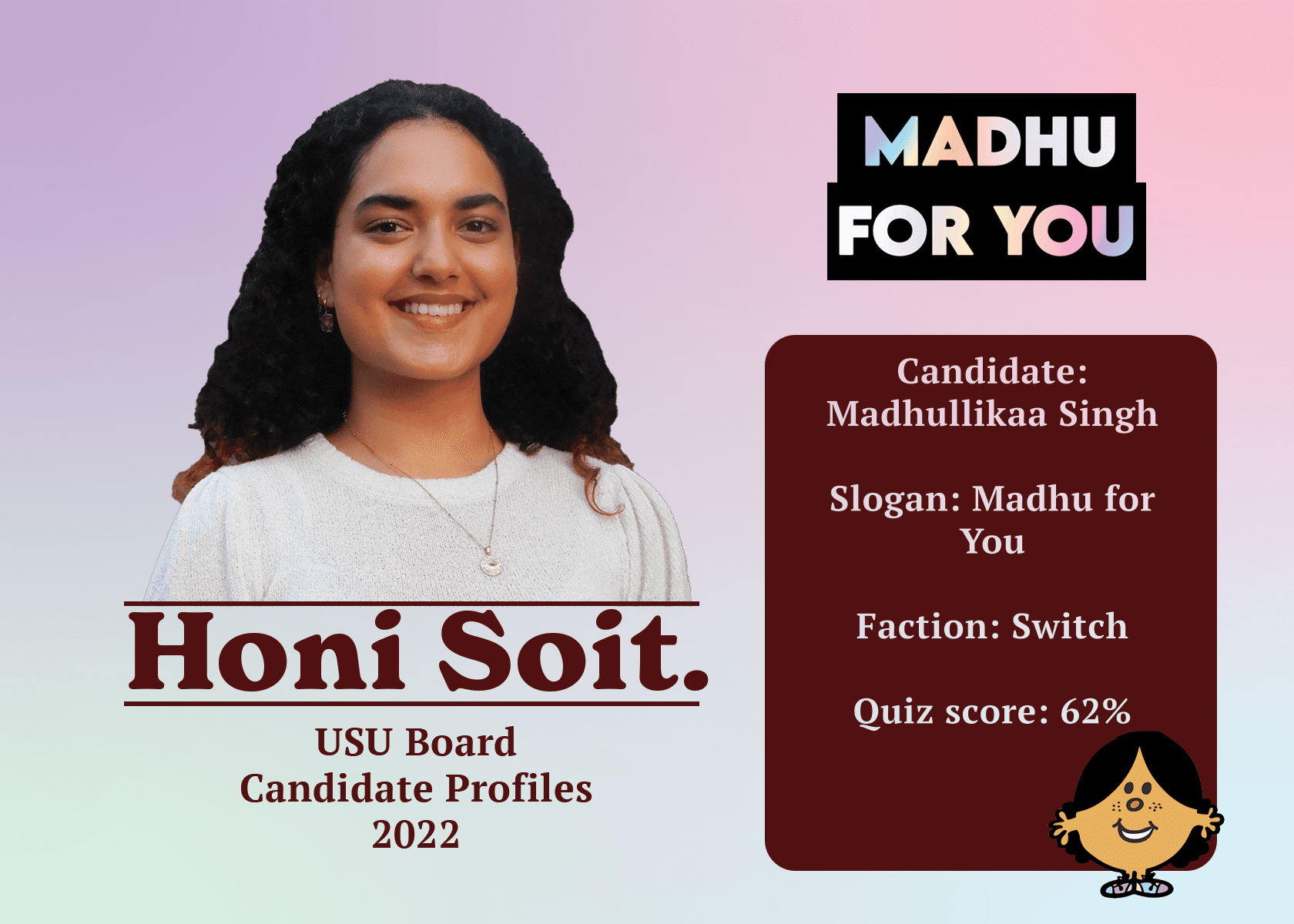Slogan: Madhu for You
Colour: Black
Quiz score: 62%
Faction: Switch
Having been in Switch for just two months, Singh ranked second only behind her factional compatriot Onor Nottle in the quiz, demonstrating a relatively sound understanding of the institutional workings of the University and USU. Singh’s most notable experience is extensive involvement in USyd’s performing arts scene, being a Producer of the upcoming POC Revue and a former member of the SUDS executive. Singh is also one of two international students in the race.
To her credit, Singh was the only candidate who was able to accurately name the Directors of Womn’s Revue, signalling that she will be comparatively well-placed to represent the interests of the USU’s historically significant revue program. She was also among few who wanted to re-expand the USU’s revue season, promising to revive the International Student Revue and start new ones such as a Disability Revue. Albeit a positive endeavour, Singh struggled to concretely address how to create sufficient student demand for her proposed revues in order to outweigh any financial burden. As such, she may underestimate the difficulty these structural obstacles pose to the implementation of her promises.
Singh also proposed that the USU create a dedicated C&S program for Indigenous students. Although having suggested “spaces for Indigenous students on campus”, it is unclear what form this will take, as there was minimal elaboration on how her policy differs from the existing Gadigal Centre. She stressed a need to consult Indigenous students, and not impose any policy upon USyd’s First Nations community. Ultimately, that these policies “have to come from Indigenous students”. Given the SRC’s lack of an Indigenous Officer this year, Singh may face an uphill battle to coordinate consultations with the University and the Board itself. Nonetheless, it was the most materially significant support for Indigenous students offered by any of the candidates.
On transparency, Singh was one of the few candidates who expressed a willingness to breach the USU Board’s notorious confidentiality requirements, should an issue of sufficient public interest arise. “If I do have to breach fiduciary duty and reveal something to the public that could risk my time as a Board member, I will do it,” she said in the interview.
It remains to be seen whether Singh can effectively deliver on this promise should she be elected given the USU’s regulations, with Board Directors who break confidentiality potentially facing legal action. Aside from committing to break fiduciary duty when deemed necessary, her suggestions recycled familiar soundbites of past candidates, such as publishing the minutes of board meetings and the full details of recruitment opportunities on the USU’s website.
Responding to revelations of fossil fuel investments in the USU by Honi, Singh is committed in a personal capacity to divestment. However, she states that given the number of students “who have a completely different view”, her preference is for the issue to be put to a general student poll rather than just a vote between Board Directors.
In a major break from tradition among the campus left, Singh, a former resident of The Women’s College, is reluctant to support abolishing USyd’s residential college system. Currently, the USU supports initiatives such as the Palladian Cup program where college residents compete with one another in a number of extracurricular activities.
While backing the eradication of the colleges’ endemic culture of sexual violence, she states that abolition is not “a feasible solution” because those inside the colleges “inherently have the power”. Preferring dialogue over abolition, Singh questioned whether efforts to dismantle residential colleges are ever effective. This puts Singh directly at odds with one of WoCo’s core political goals and her own campaign manager, Alana Ramshaw, who in the SRC General Secretaries’ Week Seven Honi report, called for the dismantling of the colleges: “Burn John’s, Burn Paul’s, Burn Drew’s, Burn Sancta, Burn Wesley, Burn Women’s”.
Singh’s acknowledgement that colleges are fundamentally harmful sits uncomfortably with her unwillingness to tackle the difficult task of abolishing these institutions. Her hesitation casts doubt on whether she can really act as a voice who can effectively hold USyd’s residential colleges to account.
Wrapping up her pitch, she said she expects to work well with fellow Board contender Naz Sharifi, speaking of the “intellectual crush” that she has on her rival. It is likely that Singh will keep her preferences within her factional boundaries and may include Sharifi on the ballot if her crush is anything to go by.
Listen to Madhullikaa Singh’ interview and read the transcript here.





